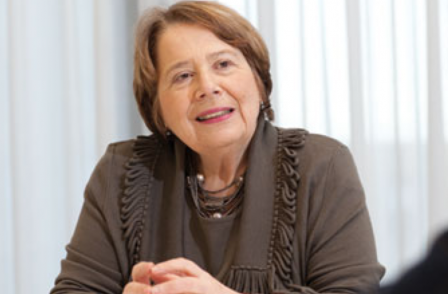
Scott Trust chair Dame Liz Forgan has said that it seemed like a “whole generation of journalists had switched off their moral compass” prior to The Guardian’s exposure of the phone-hacking scandal.
Forgan (pictured, Guardian Media Group) was speaking at an event to mark Alan Rusbridger’s departure as Guardian editor. He succeeds Forgan as head of the Scott Trust, the body which owns The Guardian and The Observer, later this year.
In a speech paying tribute to Rusbridger she said that the phone-hacking investigation was “emblematic” of the “nature and importance” of The Guardian.
She described it as “Nick Davies’s seven-year relentless, nearly doomed but ultimately vindicated, revelation of the corruption of the trade of journalism by the systematic use of phone-hacking to bully, intimidate and invade privacy on a massive scale”.
Leading Labour Party figures – including Yvette Cooper, Ed Miliband and Chuka Umunna – were among those at a party attended by various supporters of The Guardian. Former Conservative minister Jonathan Aitken, who lost a libel battle with The Guardian in 1997, was also among those at last Thursday’s event.
Forgan said: “I’m well aware that some of our competitors will never forgive The Guardian for what is seen as the betrayal of colleagues and a contribution to the jailing of journalists.
"I’m also well aware that The Guardian can sometimes appear holier than thou, even sanctimonious, to the irritation of some at the rougher end of the marketplace who point out that our ownership protects us from the cold winds that blow around their heads.
“But I don’t care. I cannot get out of my mind the disgusting narratives that unfolded at the Leveson Inquiry and at the Old Bailey telling of lives ruined, trust broken, mental health jeopardised, innocence besmirched – by people usurping the name of journalism for corrupt ends. Or maybe even worse, simply to pull wings off flies.”
She added: “Literal truth is more prized in some parts of the forest that in others. We have been hurling bread rolls at each other in mutual contempt ever since Press Awards dinners were invented.
“But the decision of sizeable numbers of national press journalists to invade the innermost privacy of anyone they fancied, rich and powerful or completely insignificant, as a substitute for normal forms of newsgathering took us to a new place.”
She said that the hacking investigation revealed that “all checks on the power of media” had been “thrown to the winds”.
Police had been corrupted by bribery, Forgan said, politicians has been “blackmailed or seduced by the overweening power of media owners”.
She noted that it was greeted at the time with “denials, cynicism, lies and indifference from people in authority – pathetic excuses from the rank and file".
She said that journalists have broken the law in the past in the name of “brave and public-spirited journalism” – but with “copper-bottomed justification”.
“This was something else. It was done out of idle curiosity, sensationalism, malice, cruelty or greed. No rules, no ethics, no standards, no sense of transgression. The media monster way out of its box with no check on its rampage. And shockingly it seemed that nobody cared.
“Allegations that cabinet ministers' phones were being hacked… came and went with barely a mention. The role of the Murdoch press in the atrocious saga seemed to be no obstacle to allowing it take over most of the British media.
“The Guardian plugged away to almost universal indifference until the Milly Dowler story broke [in July 2011] and everything changed.”
She said phone-hacking was a particularly important story because:
- “It’s about us, journalists, the people supposed to reveal iniquity and challenge the abuse of power”
- The “casual ubiquity of the practice” meant it seemed as if “a whole generation of journalists had switched of their moral compass”
- It showed “the three great bulwarks of democracy: the press, the police and parliament – were all corruptible and in many cases corrupted"
- And because "it took two years of continuous campaigning ending in a fortuitous discovery relating to an abducted schoolgirl before anyone took any notice".
Email pged@pressgazette.co.uk to point out mistakes, provide story tips or send in a letter for publication on our "Letters Page" blog
